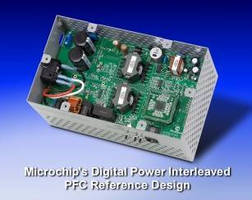Microchip's Reference Design for Digital Interleaved Power Factor Correction (PFC) Increases Power Efficiency

Free Reference Design Helps Designers of Green Power-Supply Products Lower Costs, Reduce Size and Improve Power Efficiency via Digital Power Conversion
CHANDLER, Ariz., Sept. 8, 2009 [NASDAQ: MCHP] - Microchip Technology Inc., a leading provider of microcontroller and analog semiconductors, today announced the Digital Interleaved Power Factor Correction (PFC) Reference Design, which demonstrates how to realize the benefits of fully digital PFC for green power-supply designs. Specifically, this free reference design provides an easy method to evaluate the power efficiency and features of Microchip's dsPIC33 "GS" series of Digital Signal Controllers (DSCs) for Switch Mode Power Supplies (SMPSs), in an interleaved PFC application.
The trend toward digital power conversion is enabling green power-supply designs, along with smarter and more efficient power systems. This trend helps to lower the carbon footprint of power systems and ease the burden on the world's strained power grids. High-performance power supplies are used in a wide variety of applications, including telecommunications and industrial equipment, digital televisions, lighting, air conditioners and other home appliances. Digital interleaved PFC improves the power supply's overall efficiency, along with the input power factor, voltage regulation and the Total Harmonic Distortion (THD) of the input current.
"This reference design enables our customers to quickly bring the benefits of digital interleaved PFC to their products, and create a more efficient and greener power distribution grid," said Sumit Mitra, vice president of Microchip's High Performance Microcontroller Division. "It uses the flexible dsPIC33F "GS" series of DSCs, which enables easy customization and configuration via simple modifications to the control software."
Digital interleaved PFC methods provide many advantages over older PFC techniques, including:
o Lower cost for high-power applications
o Smaller PFC inductor and magnetic volume
o Higher power density
o Lower ripple
o Easy implementation of sophisticated control algorithms
o Flexible software modifications to meet specific customer needs
o Simpler integration with other applications
Microchip's Digital Interleaved PFC Reference Design works with a universal input voltage range and produces a single, high-voltage DC output of up to 350W. Its dual-phase interleaved PFC software implements three compensators for voltage, current and load balancing. It also has a feed-forward compensator, based on the average input voltage. This reference design has six main blocks:
1. Input EMI filter and rectifier
2. Dual-phase interleaved PFC circuit with feedback
3. Plug-in module connector, populated with a dsPIC33FJ16GS504 DSC
4. User-interface circuit with programming connector and push buttons
5. 12V and 3.3V power-supply circuit
6. Fault-detection circuit for hardware protection
Additional key features of Microchip's Digital Interleaved PFC Reference Design include:
o Operates at universal input voltage (85-265 Vac, 45-65 Hz)
o Operates up to 350W sustained output
o Output voltages up to 400 Vdc
o Power factor correction of 0.998 at full load and 120 VAC input
o Current Total Harmonic Distortion (ITHD) of 3% at full load and 120 VAC input
Availability
All of the documentation, software and Gerber files needed to build this reference design can be obtained for free from Microchip's Web site at: www.microchip.com/get/400606844791667. Additionally, demonstration units are available from the Company's field sales force.
About Microchip Technology
Microchip Technology Inc. (NASDAQ: MCHP) is a leading provider of microcontroller and analog semiconductors, providing low-risk product development, lower total system cost and faster time to market for thousands of diverse customer applications worldwide. Headquartered in Chandler, Arizona, Microchip offers outstanding technical support along with dependable delivery and quality. For more information, visit the Microchip website at http://www.microchip.com/get/400606984837963.
Editorial Contact:
Eric Lawson
480-792-7182
eric.lawson@microchip.com
Reader/Literature Inquiries:
1-888-MCU-MCHP
http://www.microchip.com/get/400606844791667




